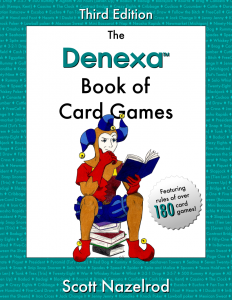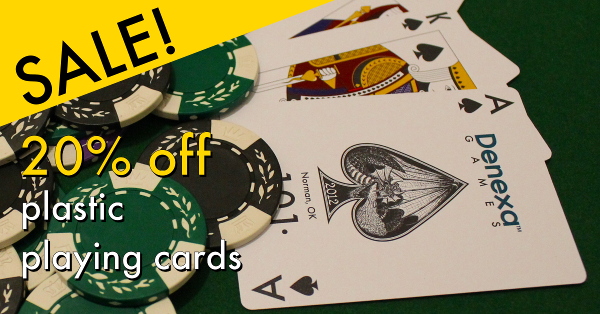Bartok
Bartok is a game in the Stops family which starts out very similar to Crazy Eights, but, as the game goes on, accumulates more and more rules with each hand! It is best for six players, but can be played by as few as two.
Object of Bartok
The object of Bartok is to be the first player to discard all of their cards.
Setup
Bartok is played with a standard 52-card deck. We heartily recommend you use a deck of Denexa 100% Plastic Playing Cards if one is available. (And if one isn’t, why not?) You may also wish to have a large piece of paper or even a dry-erase board handy to keep everyone informed as to the ever-growing rules of the game.
Rather than have a typical shuffle and deal, in Bartok, the cards are placed face down in the middle of the table and washed, the resulting pool forming the stock. Each player then draws seven cards from the stock. One player flips a random card from the stock face up. This card, the upcard, is the first card of the discard pile.
Game play
Game play begins with whichever player that takes the initiative to make the first legal play. Then, either one of their neighbors, to the left or the right, may make a legal play. Thereafter, play continues in that direction (i.e. if the first player was followed by the player to their right, then play continues on to the right).
On the first hand, Bartok is played with a simple set of rules similar to many other Stops games. On their turn, a player may play any card that matches the upcard in either suit or rank. For example, if the upcard was the 7♣, any seven or any club may be played. This card is placed on the discard pile, then the next player then must match the new upcard. If a player cannot or does not wish to play any of the cards from their hand, they may pass and draw one card; this ends their turn, and play passes to the next player.
When a player is down to one card, they must immediately (i.e. right after they set down their next-to-last card) call out “Bartok” to alert the other players. Failure to do so incurs a penalty (see below). If a player manages to successfully get rid of their last card, they win the hand.
Making a new rule
Before each hand is dealt, the player who won the previous hand declares a new rule that will be in force for the remainder of the session. The only restriction is that the rule cannot single out any particular player, and a rule cannot repeal or replace any previous rule, in whole or in part. Some example rules might be:
- When a club is played, the next card played must be even.
- When a red card is played, the next card must be black.
- When a face card is played, the next player is skipped.
- When an ace is played, direction of play reverses.
- When playing an 8, the player must say “Eight ball, corner pocket”.
- 2s are wild.
- When a 4 is played, the next player draws four cards and skips their turn, unless they can also play a 4, in which case the next player after them draws eight cards, and so on.
If all other players but the one proposing the rule unanimously agree, the rule can be vetoed, and the same player must think of an acceptable one. After a rule has been in force for at least one turn, all players may decide to repeal it at the beginning of a hand by unanimous consent.
The existing rules may be kept track of by keeping them written down somewhere visible to all players. Some players prefer instead, however, to make each player remember all of the rules currently in force, so as to make penalties more common.
Penalties
If a player is observed violating the rules of the game, they may be given a penalty of one card. Penalties may be declared by any player at any time. If multiple players notice the same violation, the penalty is considered to have been declared by the first player to mention it (i.e. a player cannot have the same violation charged against them by several players). If a player manages to skate by until the next person plays, with nobody noticing the violation, though, it is too late for the penalty to be assessed.
Note that if a player receives a penalty, they still have to play a proper card or draw on that turn. This means that it’s possible for a player to rack up multiple penalties on one turn.
Possible violations that might result in a penalty are:
- Failure to say “Bartok” when down to one card. May be declared at any time a player is noticed to have one card, although if they manage to play their last card, it’s too late for them to be penalized for it.
- Wrong card. Attempting to make an illegal play.
- Delay of game. How long before it is acceptable to call delay of game should be decided ahead of time. Some players require a play in no more than three seconds. Requiring play this quick, of course, helps encourage more wrong-card penalties. If a player still has yet to play after another delay penalty has elapsed, they may be penalized for it each time.
- Incorrect penalty call. A player who incorrectly declares a penalty on another player is themselves penalized.
Game play in Bartok continues until either all players mutually agree to end it or the accumulation of rules causes further play to become impossible.



Leave a Reply